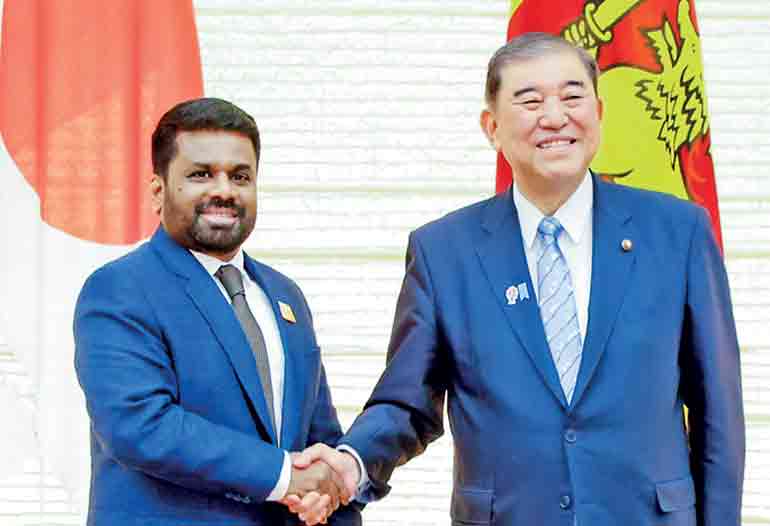Wednesday Feb 18, 2026
Wednesday Feb 18, 2026
Tuesday, 30 September 2025 02:42 - - {{hitsCtrl.values.hits}}

President Anura Kumara Disanayake with Japanese Prime Minister Shigeru Ishiba during their meeting in Tokyo yesterday
Japan and Sri Lanka agreed to deepen cooperation across economic, investment, security and multilateral fronts, issuing a joint statement yesterday after President Anura Kumara Disanayake’s meeting with Japanese Prime Minister Shigeru Ishiba in Tokyo.
Ishiba commended Sri Lanka’s recovery path under the International Monetary Fund (IMF) program and debt restructuring, pledging continued Japanese support. As co-chair of the Official Creditor Committee, Japan was the first to conclude a bilateral restructuring deal with Colombo earlier this year.
Both sides agreed that steady implementation of reforms and early completion of debt restructuring are critical to restoring investor confidence and underlined the need for foreign loans consistent with debt sustainability.
Economic cooperation featured prominently.
Japan resumed 11 previously signed yen-loan projects in 2024, including transmission lines and digital television infrastructure.
Both leaders welcomed the recommencement of bidding for the second phase of the Bandaranaike International Airport expansion and pledged to expedite completion.
They also signed notes on grant aid to boost productivity in the dairy sector and agreed on the importance of transport solutions to ease congestion in Colombo and other major cities.
On trade and investment, the two sides endorsed a roadmap for an export-oriented industrial corridor and agreed to resume the Inter-Governmental Economic Policy Dialogue.
They welcomed the launch of a Japan–Sri Lanka Committee on Business Environment in August, to be held quarterly, aimed at improving transparency, predictability and non-discriminatory treatment for investors.
President Disanayake highlighted a qualitative shift in the investment environment and invited Japanese corporates to explore opportunities in ICT, energy, tourism, manufacturing and other sectors.
Security cooperation was also advanced. Japan confirmed the provision of unmanned aerial vehicles to enhance Sri Lanka’s maritime surveillance and disaster relief capabilities under its Official Security Assistance program, the first extended to Sri Lanka.
Both sides welcomed continued port calls by Japan Maritime Self-Defence Force vessels, joint naval exercises, and the convening of the second Japan–Sri Lanka Defence Dialogue following the defence minister’s visit to Colombo in May.
The statement also included broader governance and development commitments. Japan pledged continued support for Sri Lanka’s anti-corruption drive and for socio-economic development in the Northern and Eastern Provinces.
Both sides welcomed Japan’s assistance to demining programs, contributing toward a “Mine-Impact-Free Sri Lanka.”
People-to-people exchanges will be expanded through skilled labour mobility, culture and sports cooperation, and greater promotion of Japanese language education in Sri Lanka.
On foreign policy, both sides reiterated support for a “Free and Open Indo-Pacific”, the rules-based international order and multilateralism.
They reaffirmed the importance of the 1982 United Nations Convention on the Law of the Sea (UNCLOS) for maritime stability, backed early reform of the UN Security Council and Sri Lanka’s continued support for Japan’s permanent seat bid.
The sides also committed to cooperation on nuclear non-proliferation, citing the NPT, Sri Lanka’s ratification of the CTBT, and the IAEA Additional Protocol.
Sri Lanka’s participation in Expo 2025 in Osaka and high-level business events in Tokyo and Osaka were noted as opportunities to further strengthen trade and investment links.
President Disanayake expressed gratitude for Japan’s hospitality and for its long-standing role as a partner in Sri Lanka’s economic and social development.
The joint statement concluded with both Governments affirming that steady reforms, infrastructure development, and improved business conditions will be central to attracting Japanese investment and supporting Sri Lanka’s recovery.